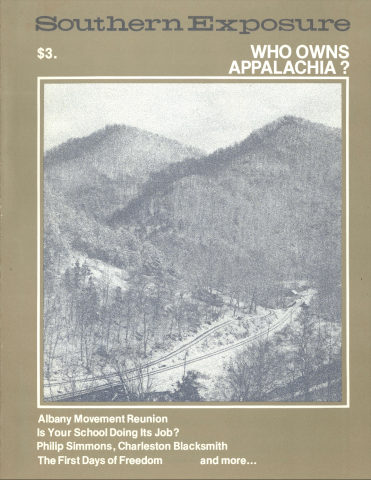Tax Revolt in Kentucky

This article originally appeared in Southern Exposure Vol. 10 No. 1, "Who Owns Appalachia?" Find more from that issue here.
Tax revolt is an American tradition at least as old as the Boston Tea Party of 1773. Now, in Appalachia, in county after county, it’s being kept alive by angry citizens armed, in many cases, with the findings of the land study. They are demanding that the giant corporate owners of the region’s vast mineral, timber and land wealth pay their fair share into county coffers.
The 1970s saw middle-class homeowners all across the country rebelling against the upwardly spiraling property taxes needed in inflationary times. By all rights, Appalachia with its land wealth should not be facing a property tax crisis; yet, as we’ve seen from the land study, much of this wealth is virtually untaxed. And there, the citizens’ new cry is not that they should pay less, but that the corporate and absentee owners should pay more. Their tax revolt is urgent and gaining steam as the Reagan administration slashes the federal programs that have supported Appalachian schools and services since the War on Poverty.
The land study’s richly documented findings on taxation caught the attention of the press all across the region. A lead editorial in the Louisville Courier-Journal proposed legislative action against “this economic colonialism,” and the Nashville Tennessean called the situation “an outrage.” The Charleston Gazette demanded, “End the exploitation.”
In Alabama, the study’s release coincided with legislative debate on a bill to provide tax relief for the timber industry. With copies in hand, opponents filibustered, reading the findings into the record. And, though the bill eventually passed, the new tax reduction was limited to plots of less than 2,500 acres, a striking blow to the big timber companies.
In Tennessee, Save Our Cumberland Mountains (a grassroots group of coalfield residents) has organized several county campaigns around land study findings. One, for example, targets the Koppers Company, a Pittsburgh energy firm that owns one-third of Campbell County and plans a giant synthetic fuels plant nearby.
In West Virginia, the legislature is considering a bill calling for an “excess acreage tax” on companies with large holdings. And if a pending court case there — the Pauley case - is successful, the effect will be the revamping of the property tax structure to provide greater revenues for schools.
It is in Kentucky, though, where the coal companies pay the least, that action is needed the most. And the land study has helped to crystallize a campaign for action. The Martin Countian, a weekly paper in the county singled out as possibly the most serious victim of undertaxation of big landowners (see page 40), serialized the land study in its pages. Here, one of its reporters describes what has happened since the study was published.
Martin County is Kentucky’s second largest coal producer, yet its county government is desperately poor. Now, though, some residents calling themselves the Concerned Citizens of Martin County (CCMC) have launched an “awareness campaign” to alert their neighbors to the fact that the big absentee-owned corporations are not pulling their weight. And their educational workshops on taxation, small group meetings and articles in the Martin Countian have already put enough pressure on the tax assessor and local board of assessment appeals to quadruple the tax bill sent to Pocahontas-Kentucky Corporation, the company that owns one-third of the surface and more than half the minerals in the county. (The assessment is under appeal at the state level, but the CCMC is watching closely.)
By focusing attention on a provision in the state constitution that requires all real property to be assessed at its fair cash value, CCMC has also forced increases in the assessments on other large land holdings. The group follows judicial actions and has occasionally filed briefs as a “friend of the court,” the idea being that major court decisions affecting local conditions should reflect local situations. And CCMC is now planning a lawsuit charging that land companies and coal corporations are illegally claiming agricultural exemptions for land that isn’t agricultural.
The recent reassessments have increased the tax base and helped alleviate the county’s financial problems, but still more revenue is vital — the county has no hospital, no sewage system, no legal landfill, an inadequate water system, bad roads and old run down school buildings. The CCMC has found that state laws and regulations are standing in the way of meaningful tax reform, so they joined forces recently with people in seven other eastern Kentucky counties, and the Kentucky Fain Tax Coalition was born. By way of workshops, mass mailings, newspaper articles and so forth, the new coalition is gearing up to put tax inequities on the agenda of the 1982 session of the Kentucky legislature. The goals are to maximize local control of the taxation process, explore different kinds of mineral taxation (the severance tax, for example), be the people’s watchdog over the state revenue department and generally resolve the systematic problems that lie at the state level. At the same time the coalition encourages local groups to apply the pressure needed to get new, fair assessments within their own counties and to oversee local revenues until every landowner is paying a fair share.
Tags
Joe Szakos
Joe Szakos, 31, is a staff coordinator for the Kentucky Fair Tax Coalition. (1985)
As an organizer with the Appalachian Alliance, Joe Szakos helped launch the Kentucky Fair Tax Coalition which became Kentuckians for the Commonwealth. (1982)